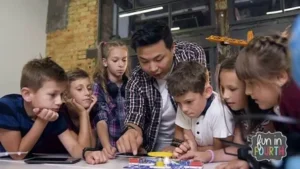The Good and the Beautiful Controversy:In later a long time, homeschooling has surged in notoriety, with numerous families looking for choices to conventional instruction. Among the various educational modules accessible, The Great and the Lovely stands out, both for its locks in substance and the contentions encompassing it. Why has this educational modules started such strongly wrangle about? Is it genuinely a great fit for your family? This article dives into the The Great and the Wonderful contention, looking at its qualities, shortcomings, and the suppositions of those who have experienced it firsthand.
What is The Great and the Beautiful?

The Great and the Wonderful is a comprehensive domestic school educational programs planned for understudies from preschool through tall school. Its mission is to give high-quality instruction that consolidates scholarly thoroughness with ethical and character advancement. The educational programs incorporates subjects such as dialect expressions, maths, science, and craftsmanship, all displayed in a flawlessly planned format.
Its mission is to give high-quality, character-based instruction that cultivates a cherish of learning and ingrains ethical values. The educational modules is known for its locks in materials, counting perfectly outlined books and hands-on exercises that offer to a assortment of learning styles.
In expansion to its scholarly centre, The Great and the Lovely put a solid accentuation on character advancement and otherworldly development. The program is outlined to be user-friendly for guardians, with open-and-go lesson plans and negligible planning required, making it open for families looking for a adjusted and improving instructive involvement. In general, it points to make a sustaining environment where children can flourish scholastically and personally.
Key Highlights of the Curriculum
- Comprehensive Enter Subjects – Covers fundamental disciplines like Arithmetic, Science, Dialect Expressions, and Social Studies.
- Skill-Based Learning – Enter on basic considering, problem-solving, communication, and collaboration.
- Technology Integration – Utilise of computerised devices, coding, and AI to upgrade learning.
- Project-Based & Experiential Learning – Hands-on exercises, real-world applications, and internships.
- Personalised Learning Ways – Versatile learning modules catering to person understudy needs.
- Global & Social Mindfulness – Multicultural considers, remote dialects, and worldwide citizenship programs.
- STEAM/STEM Enter – Accentuation on Science, Innovation, Designing, Expressions, and Mathematics.
- Social-Emotional Learning (SEAL) – Advancement of passionate insights, versatility, and interpersonal skills.
- Assessment & Input Frameworks – Nonstop assessment through tests, ventures, and peer reviews.
- Extracurricular & Co-Curricular Exercises – Sports, expressions, wrangle about, and clubs for all encompassing advancement.
The Great and the Excellent Controversy
The Great and the Wonderful, a prevalent domestic school educational programs made by Jenny Phillips, has confronted discussion over its approach to instruction and its basic values. A few have too raised concerns around its overwhelming accentuation on magnificence and vision, which they claim may ignore the complexities of history, science, and writing. Furthermore, the company’s commerce hones, counting forceful copyright requirement and a need of straightforwardness in its origin, have drawn feedback from homeschooling communities.
Supporters, in any case, commend The Great and the Lovely for its high-quality, literature-rich substance and its centre on character advancement. Phillips and her group have made endeavours to address reactions by reexamining certain materials and extending subject offerings, but talks about proceed over whether the educational modules genuinely suits assorted viewpoints. Eventually, whereas it remains a favourite among a few traditionalist Christian homeschooling, others caution that its one-size-fits-all approach may not suit each child’s needs.
1. Devout Concerns
Religious concerns frequently emerge in different settings, reflecting the different convictions and hones that shape person and communal characters. For occasion, issues like regenerative rights, marriage balance, and flexibility of expression habitually cross with devout convictions, provoking talks about approximately the part of confidence in open life. Exploring these complexities requires affect ability and a eagerness to lock in in exchange that regards varying perspectives whereas looking for common ground.
Additionally, devout concerns can altogether affect mental well being and well-being. Numerous people turn to their confidence for back amid challenging times, finding comfort in ceremonies, community, and otherworldly direction. Be that as it may, when devout convictions struggle with individual encounters or societal standards, this can lead to sentiments of blame, separation, or trouble. By cultivating situations where people feel secure to express their devout concerns, we can advance understanding and recuperating over distinctive confidence traditions.
2. Educating Methods
Teaching strategies allude to the techniques and methods teachers utilise to convey information and encourage learning. These strategies shift depending on the subject, students’ needs, and learning targets. Other successful strategies incorporate problem-based learning (PL), where understudies fathom real-world issues, and flipped classrooms, where learners audit materials at domestic and lock in in commonsense applications amid course. The choice of strategy depends on variables like lesson measure, understudy engagement levels, and craved outcomes.
Modern instructing progressively emphasises student-centred approaches, prioritising dynamic learning over inactive tuning in. Collaborative learning, such as peer instructing or project-based assignments, cultivates basic considering and cooperation. Eventually, viable instructing strategies adjust to learners’ needs, combining conventional and inventive hones to make an comprehensive, energetic classroom environment.
3. Claims of Exclusivity
Claims of exclusivity frequently highlight an organisation’s commitment to differences, value, and having a place, signalling that all individuals—regardless of race, sex, capacity, or background—are welcome and esteemed. In any case, without concrete actions—such as comprehensive enlisting hones, available spaces, or impartial policies—these claims can ring empty, serving as shallow showcasing or maybe than honest to goodness endeavours toward systemic alter. Genuine exclusivity requires continuous responsibility, quantifiable results, and a readiness to address inclinations and obstructions inside structures.
When exclusivity is truly practices, it makes situations where assorted voices are listened, regarded, and enabled. On the other hand, per developmental exclusivity—making articulations without significant follow-through—can extend doubt, especially among marginalised bunches who recognise the difference between words and activities. This implies effectively tuning in to underrepresented communities, contributing in impartial openings, and ceaselessly assessing advance. As it were at that point can claims of exclusivity decipher into unmistakable, trans formative impact.
Real-Life Encounters: Voices from the Domestic school Community

Homeschooling offers families a interesting opportunity to tailor instruction to their children’s needs, and numerous guardians highlight the bliss of observing their kids flourish in a adaptable, personalised environment. Others emphasise the solid family bonds shaped through shared learning encounters, from hands-on history ventures to off the cuff field trips. In any case, they too recognise challenges, such as adjusting educating with family obligations or finding social openings, but most concur the rewards distant exceed the struggles.
Students, as well, voice appreciation for domestic schooling’s flexibility to jump profound into interface whereas maintaining a strategic distance from the weights of swarmed classrooms. However, a few concede lost the every day social intelligent of conventional school, in spite of the fact that co-ops, sports groups, and community bunches frequently fill the crevice. For numerous families, homeschooling isn’t fair an instructive choice—it’s a way of life that cultivates interest, autonomy, and flexibility, indeed if the travel isn’t continuously simple. Their stories reflect a differing, developing community reclassifying what learning can see like.
Positive Testimonials
“I couldn’t be more joyful with the benefit I gotten! From begin to wrap up, the group was proficient, mindful, and really went over and past to meet my needs. The quality of the item surpassed my desires, and the whole involvement was consistent. I exceedingly suggest this company to anybody looking for top-notch benefit and exceptional comes about. Five stars without a doubt!”
“Working with this group was an outright game-changer for me. Their ability and devotion made all the contrast, and I saw extraordinary comes about in no time. What stood out the most was their honest to goodness care and commitment to client fulfilment. I’ve as of now alluded a few companions, and they’ve had the same astonishing encounter. Thank you for conveying excellence—I’ll certainly be back for future needs!”
Critiques from Users
Users regularly evaluate items or administrations based on their individual encounters, highlighting both qualities and shortcomings. Common reactions incorporate destitute client benefit, need of instinctive plan, or neglected desires in usefulness. For occurrence, numerous clients express dissatisfaction when an app or gadget doesn’t perform as promoted, driving to disappointment. Helpful input from clients is priceless for companies pointing to make strides their offerings, but negative audits can moreover hurt a brand’s notoriety if not tended to promptly.
On the other hand, a few studies stem from bungled desires or person inclinations or maybe than imperfections in the item itself. A include one client finds basic might be unimportant to another, driving to polarised suppositions. Furthermore, evaluates frequently reflect broader patterns, such as requests for way better sup portability hones or more comprehensive plan. Adjusting client input with the product’s centre vision is key to keeping up believe and driving development.
FAQs about The Good and the Beautiful Controversy
Q: What is The Great and the Excellent curriculum?
The Great and the Excellent (TB) is a prevalent Christian-based domestic school educational modules made by Jenny Phillips. It emphasises literature-rich, family-centred learning with a centre on ethical character, nature, and “the great and the wonderful” in instruction. The program covers centre subjects like dialect expressions, mat, history, and science.
Q: Why is The Great and the Excellent controversial?
Faultfinders raise a few concerns:
- Religious Inclination – The educational programs coordinating Latter-day Holy person (LS/Mormon) values, in spite of the fact that the company claims its non-denominational. A few Christian families discover its religious philosophy dubious or conflicting with their beliefs.
- Science & History Reactions – A few clients contend the science materials dodge points like advancement, whereas history lessons may show a whitewashed or Afrocentric perspective.
- Lack of Differences – Pundits say the writing and symbolism need racial and social representation.
- Authoritarian Tone – A few guardians feel the curriculum’s unbending structure disheartens basic considering or free exploration.
Q: Do common families utilise The Great and the Beautiful?
Yes, but regularly specifically. A few common families adjust the dialect expressions or mat programs whereas overlooking devout substance. Be that as it may, numerous favour completely mainstream choices due to the curriculum’s basic worldview.
Q: Has the educational modules changed over time?
Yes. TB has changed a few materials in reaction to criticism, such as including more assorted writing and altering science substance. Be that as it may, centre philosophical and devout establishments remain.
Q: Ought to I utilise The Great and the Wonderful for my domestic school?
It depends on your family’s values and goals:
- Pros: Reasonable, outwardly engaging, solid phonics/literature centre, open-and-go structure.
- Cons: Possibly exclusionary substance, constrained secular/scientific thoroughness, and doctrinal concerns for a few Christians.
- Tip: Audit tests on their site and compare with other educational program some time recently deciding.
Conclusion
The Great and the Lovely educational programs offer a one of a kind approach to homeschooling that reverberates with numerous families. Whereas the contentions encompassing it are substantial and merit thought, the last choice rests with each family. By weighing the stars and cons, guardians can decide whether this educational program adjusts with their instructive philosophy.
As you set out on your homeschooling travel, keep in mind that the best instruction is one that meets your families one of a kind needs. Remain educated, look for assorted viewpoints, and lock in with the community. Your voice things in this progressing discussion approximately instruction!
